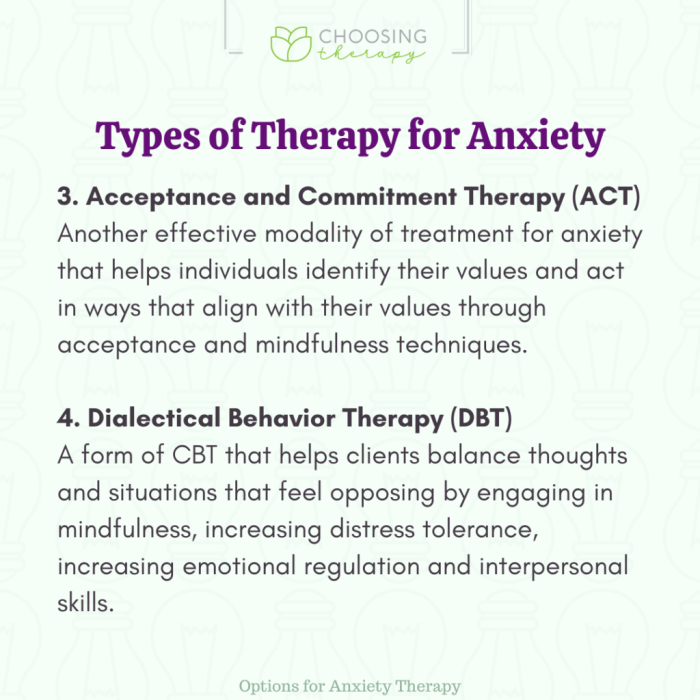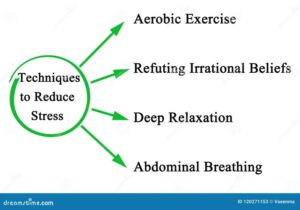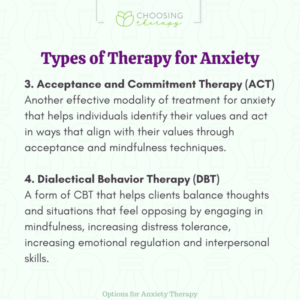
Welcome to the wild world of Therapy for anxiety, where we tackle those pesky little mental gremlins that love to crash our brain’s party! Think of anxiety as that overly enthusiastic friend who shows up uninvited, but fear not, we have the perfect strategies to send them packing with a smile and a wave.
In this delightful exploration, we’ll dive into the various therapies available to keep anxiety in check, from cognitive-behavioral therapy (CBT) that reprograms your thoughts like a trusty old computer, to exposure therapy that helps you face your fears like a superhero donning their cape. We’ll also guide you on the quest to find a qualified therapist who’s more than just a couch and a notepad!
Therapy for Anxiety

Anxiety can feel like an unwelcome party crasher at your life’s soirée, but fortunately, therapy can be a bouncer that helps you regain control. With an array of therapeutic options available, dealing with anxiety can transform from an arduous climb up a mountain of dread into a refreshing stroll through a tranquil garden of coping strategies. Let’s explore the different types of therapy, the benefits they bring, and how you can find the right therapist to help you breathe a little easier.
Types of Therapy for Anxiety
There are several effective types of therapy designed to tackle anxiety head-on. Among the most popular are cognitive-behavioral therapy (CBT) and exposure therapy, each offering a unique approach to managing those pesky anxiety symptoms.
- Cognitive-Behavioral Therapy (CBT): This therapy focuses on identifying and changing negative thought patterns that contribute to anxiety. Think of it as a mental reboot that helps you catch those sneaky, irrational thoughts and replace them with more realistic ones. It’s like swapping out your old, glitchy operating system for a shiny new version that runs smoothly.
- Exposure Therapy: This approach gradually exposes individuals to the sources of their anxiety in a controlled environment, allowing them to face their fears without the threat of danger. Imagine it as a training montage from an action movie, where the hero slowly learns to face the dragons instead of running away from them.
Both types of therapy can work wonders for managing anxiety, as they provide you with tools and techniques to navigate the chaos in your mind.
Benefits of Therapy in Managing Anxiety Symptoms
Therapy is not just a fancy chat over tea; it comes with a plethora of benefits that can significantly improve your quality of life.
- Skill Development: Therapy equips you with essential coping strategies and skills that empower you to handle anxiety when it strikes. It’s like adding a Swiss Army knife to your mental toolkit!
- Safe Space for Expression: Talking to a trained professional offers a judgment-free zone where you can express your feelings and thoughts. It’s your personal safe haven, free from unsolicited advice from that one friend who thinks they know it all.
- Improved Relationships: As you learn to manage your anxiety, your relationships with others can blossom. With less emotional turmoil, you can connect with friends, family, and colleagues in a more meaningful way. Who knew that a calmer you could unlock the secrets to social butterflies?
The journey through anxiety may be challenging, but therapy can light the way, helping you transform fear into confidence.
Finding a Qualified Therapist for Anxiety Issues
Finding the right therapist can feel like searching for a needle in a haystack, but it doesn’t have to be that daunting. Here’s a step-by-step guide to help you on your quest for a fabulous therapist who can help you tackle anxiety with flair.
- Identify Your Needs: Think about what you’d like to address in therapy. Are you looking for someone who specializes in CBT, or maybe someone who can guide you through exposure therapy? Knowing your needs is like having a treasure map!
- Ask for Recommendations: Tap into your social network or reach out to your doctor for suggestions. Friends and family can be great resources in this quest – just ensure they’re not recommending that cousin who claims to be an expert just because they binge-watched a therapy show.
- Check Credentials: Verify that your potential therapist is licensed and has experience dealing with anxiety. It’s like checking the reviews before ordering that trendy new gadget – you want to ensure it actually works!
- Schedule a Consultation: Many therapists offer initial consultations. Use this opportunity to gauge whether you connect with them. Chemistry is important, much like the perfect pairing of peanut butter and jelly!
- Trust Your Instincts: After your first session, check in with yourself about how you felt. If it’s a match made in therapy heaven, great! If not, don’t hesitate to keep searching until you find your ideal therapist soulmate.
Integrating Health and Fitness for Anxiety Management
Physical exercise serves as a powerful ally in the battle against anxiety, acting like a trusty sidekick equipped with a cape made of endorphins. When it comes to managing stress and anxiety, breaking a sweat isn’t just for the fitness fanatics or those who believe that “exercise” is a fancy word for “running late.” Regular physical activity can significantly reduce anxiety levels, improve mood, and enhance overall mental health—because who needs a spa day when you can just do a few jumping jacks?One of the key benefits of exercise is its ability to produce endorphins, those delightful little neurotransmitters that can make you feel like a million bucks.
Exercise also lowers levels of the body’s stress hormones, such as adrenaline and cortisol, which can turn your peaceful day into a rollercoaster of anxiety. So, let’s lace up those sneakers and explore some effective aerobic exercises that can help keep anxiety at bay while we pretend to be fitness gurus!
Effective Aerobic Exercises for Mental Health
Engaging in aerobic exercises can boost both physical and mental well-being. Here are some tried-and-true aerobic exercises that not only get your heart racing but also help calm your mind:
- Walking: A leisurely stroll can do wonders for your mind. Just remember to smile at random passersby to boost your mood even more!
- Running: Known as a natural antidepressant, running can help channel those anxious vibes into speedy feet. Just try not to trip over your own thoughts!
- Cycling: Whether outdoors or on a stationary bike, cycling offers a fun way to clear your mind while embracing your inner Tour de France champion.
- Dancing: Feel the rhythm and let loose! Dancing combines physical exertion and self-expression, all while making you look ridiculously cool (or hilariously awkward—both work!).
- Swimming: If you prefer a splashy approach, swimming is low-impact and perfect for freeing your mind while pretending to be a mermaid (or merman). What better way to float away your worries?
These exercises not only promote cardiovascular health but also create a wonderful distraction from daily stressors. So, whether you channel your inner Olympic sprinter or just wiggle your toes in rhythm to your favorite playlist, remember that every step counts!
Weekly Fitness Plan for Anxiety Management
Creating a structured fitness plan can help integrate these exercises into a consistent routine. Here’s a sample weekly fitness plan that combines various aerobic activities to keep things fresh, fun, and anxiety-free!
| Day | Activity | Duration |
|---|---|---|
| Monday | Brisk Walking | 30 minutes |
| Tuesday | Yoga & Stretching | 45 minutes |
| Wednesday | Running | 20 minutes |
| Thursday | Dancing to Music | 30 minutes |
| Friday | Cycling | 40 minutes |
| Saturday | Swimming | 30 minutes |
| Sunday | Rest & Recovery | — |
This weekly plan ensures a balanced approach to physical fitness, combining various activities to prevent burnout and keep your spirits high. Remember, the goal is to enjoy the process while effectively managing anxiety. So grab your favorite workout gear, shake off those worries, and get ready to embark on a journey of physical and mental wellness!
Exploring Alternative Therapies for Anxiety Relief

In a world where stress can feel like that unwelcome houseguest who overstays their welcome, exploring alternative therapies for anxiety relief can be as refreshing as a cool breeze on a hot day. From ancient practices like acupuncture to modern wonders such as aromatherapy, these therapies can offer support alongside traditional methods. So, let’s dive into the wonderful world of alternative therapies and see if we can find something that tickles your fancy—and calms your nerves!
Various Alternative Therapies for Anxiety Management
Alternative therapies have garnered attention for their potential to complement traditional anxiety treatments. The following therapies have shown promise in alleviating anxiety symptoms:
- Acupuncture: This ancient Chinese practice involves inserting thin needles into specific points on the body. While it may sound intimidating, many find it surprisingly soothing. Studies indicate that acupuncture can help reduce anxiety by promoting relaxation and balancing energy levels.
- Aromatherapy: The use of essential oils like lavender and chamomile can create a serene atmosphere. Inhaling these calming scents might just turn your anxiety into a fleeting memory. Scientific evidence supports that certain aromas can lower cortisol levels, leading to a more relaxed state.
- Yoga and Meditation: Not just for the Instagram influencers, yoga combines physical movement with mindfulness, and studies have shown it can be as effective as some medication in reducing anxiety levels. Meditation, on the other hand, is like a mini-vacation for your mind, providing a mental break from the chaos of daily life.
- Herbal Supplements: Herbs such as ashwagandha and passionflower have been used for centuries to combat anxiety. While they may not come with a cape, they certainly have superhero-like qualities in terms of calming effects.
It’s essential to remember that while these therapies can be effective, they should be integrated with traditional treatments for optimal results.
Comparison of Effectiveness: Traditional Therapy vs. Alternative Therapies
When weighing the effectiveness of traditional therapy against alternative therapies, it’s like comparing apples to oranges—both are nutritious, but they offer different flavors. Traditional therapy, such as cognitive-behavioral therapy (CBT), is evidence-based and has a wealth of research backing its effectiveness in treating anxiety disorders. In contrast, alternative therapies often focus on holistic healing and may contribute positively to a person’s overall well-being, but the evidence for their efficacy can be less robust.
“The best therapy is one that resonates with you, whether it’s traditional talk therapy or a calming yoga session.”
Studies have shown that an integrative approach often yields the best results. For instance, a combination of CBT and mindfulness practices can help individuals develop coping strategies while also promoting relaxation.
Lifestyle Changes and Holistic Approaches for Anxiety Relief
Lifestyle changes can play a crucial role in reducing anxiety. Embracing a holistic approach means considering the whole person—mind, body, and spirit. Here are some effective lifestyle adjustments that can significantly help manage anxiety symptoms:
- Regular Exercise: Physical activity can lead to the release of endorphins, the body’s natural mood lifters. Even a brisk walk can work wonders in dissipating that anxious energy.
- Balanced Diet: Foods rich in omega-3 fatty acids, whole grains, and leafy greens not only nourish the body but also support brain health. Think of healthy eating as your anxiety-fighting armor!
- Sleep Hygiene: Quality sleep is essential for emotional regulation. Establishing a bedtime routine and creating a sleep-friendly environment can enhance sleep quality and ultimately reduce anxiety levels.
- Social Connections: Surrounding yourself with supportive friends and family can provide a buffer against anxiety. Engaging in social activities can shift focus from worries, creating a sense of community and belonging.
Incorporating these lifestyle changes doesn’t require a complete overhaul of your life—think of it as tuning up your favorite car; sometimes a little adjustment is all it takes to run smoothly again!
Final Wrap-Up
As we wrap up this joyride through the realm of Therapy for anxiety, remember that while anxiety may feel like a squawking parrot on your shoulder, you have the tools to silence it. Whether you choose traditional therapy, sprinkle in some alternative practices, or get your heart pumping with a workout, the path to peace of mind is well within your reach.
So, take a deep breath, and let’s kick anxiety to the curb together!
User Queries
What are the signs that I need therapy for anxiety?
If you’re finding it hard to breathe in public or your worries are throwing impromptu dance parties in your head, it’s time to consider therapy!
How long does therapy for anxiety usually take?
It varies, but think of it like baking a cake: some need a quick oven timer while others require a leisurely bake. Generally, you might start feeling better in a few sessions!
Can I do therapy online?
<pAbsolutely! Online therapy is like having your therapist in your pocket—just make sure to find a quiet corner and maybe wear some pants!
How do I know if my therapist is a good fit?
If they make you feel like a rockstar in your own mental concert, you’re on the right track! Trust your gut—it’s usually more reliable than a fortune cookie!
Can therapy replace medication for anxiety?
Sometimes yes, sometimes no! It depends on your unique situation—think of therapy and medication as a dynamic duo, like Batman and Robin, working together to save the day (or your brain)!





